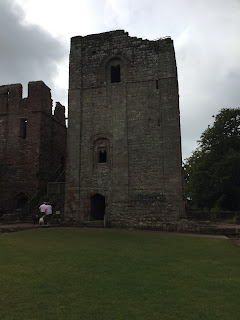We didn’t pick a particularly nice
day. The weather was overcast, turning the Herefordshire countryside into Mordor
littered with castles. Goodrich castle is one of my favourites
and right on our doorstep. It was built in 1095 by Godric of Mappestone, a Saxon thane. Initially constructed from earth and wood, it was designed to guard the borderlands from
the turbulent Welsh.
The stone keep. It was originally higher and had battlements
Entrance into the Keep. Note how thick the walls are.
A stone keep replaced the original castle in the C12th and reflects the age where defence was paramount and comfort came a poor third. The walls are so thick there isn’t room to swing a cat inside, and the obese
have no chance of climbing the stairs. These follow the corkscrew model and are
exceptionally narrow. From the top you can see the Welsh hills, the
surrounding terrain and a threatening sky.
Some people inadvertently catch UFOs in their shots. I seem to have caught an alien structure. It wasn't there when I took the photo and I have no rational explanation. 'Tubular Ghosts.'
The castle guarded crossing points to the River Wye, the old Roman
road from Gloucester to Monmouth and was part of a chain in the
Hereford—Ross-on-Wye area. The Keep also has its own ghost, an Irish chieftain
who was imprisoned and died there.
The square Keep shown below looks substantial but its weakness lies in its corners. As the castle developed towers were built round ie without corners and so therefore harder to undermine.
As you approach the Gatehouse and
pass through, you can see the usual arrow slits to either side, and the murder
holes from above. What is unusual however is the proximity of the Chapel to the
Gatehouse. This is taking ‘Muscular Christianity’ to the extreme, for in the
wall is an arrow slit—part of the defence of the Gatehouse and when the bar
was drawn back to open the great wooden door, it passed through an aperture in
the Chapel wall and blocked both altar and tabernacle.
Entering the Gatehouse. A very beautiful lady is inspecting an arrow slit on the other side of which is the Chapel.
The Gatehouse and Chapel as seen from the inner ward. Roaring Meg is in the foreground. Small but powerful and perfectly formed.
In time the castle grew larger.
From this wall you can see the original line of a roof and the extension above
it. The wall also gives a view of the moat and the spur on rounded tower.
A view of the solarium from the Gatehouse. Below this were storage rooms and a postern gate that led to the moat.
Exiting the gateway and view little changed from the C12th.
The castle was built on a natural outcrop of rock. This along with the spurs or buttresses seen here made mining the walls or towers almost impossible.
The castle was slighted by the
Parliamentarians in the English civil war. Parliament’s forces were led by Colonel
John Birch, and his canon – ‘Roaring Meg’ —is the first thing you see as you
pass through the gatehouse. The castle however got its revenge. His niece,
Alice Birch, fell in love with Charles Clifford, a dashing young Royalist. They
tried to escape before the final assault but were drowned in crossing the River
Wye. Their ghosts haunt the castle to this day.



















2 comments:
Every time I see a picture of thick castle walls and narrow walkways, I have to wonder how the heck those guys built it. They couldn't have been as big as guys are today, yet they managed to build enormous structures that have lasted centuries.
We're wimps compared to them.
Different skill sets, I suppose, but yes — wimps :)
I'm still mightily puzzled by that tubular ghost floating down from the keep, though. It wasn't there as I lined up the iPod. It wasn't there!
Post a Comment